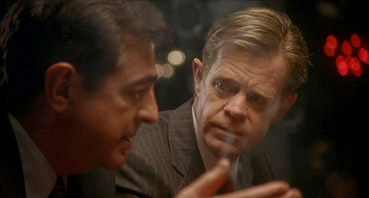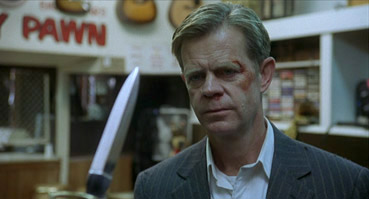|
If you were sitting here with me, there would be two ways we could do this. I could tell you up front that Edmond is based on a play by David Mamet or I could show you a couple of minutes of the film and let you work it out for yourself. That's not meant as a brickbat, it's just that Mamet has a particular way with dialogue that can be very distinctive and instantly recognisable. I'm not talking about his famed use of stronger language that lazy commentators use to attack his work, but those short staccato exchanges between two characters in which issues of life and society are discussed in a semi-philosophical manner that is neither naturalistic nor completely artificial. It's as much about the rhythm as the words themselves, a music of language that fragments communication into half-formed sentences and incomplete thoughts.
One of the most memorable examples of this approach can be found in the opening scene of Mamet's controversial 1992 play Oleanna, in which an extended exchange between university professor John and feminist student Carol sees both characters repeatedly interrupting the flow of the other so that neither is able to complete a sentence. Edmond was written a decade earlier, but the staccato dialogue and the self-destructive exposure of the failings and prejudices of an ordinary man, coupled with the controversy both works have attracted, make the two plays interesting bedfellows. It's a bond cemented by the casting of William H. Macy as the title character here – Macy played the lead in both the stage and Mamet's own 1994 film version of the later play.

A quick plot summary should give you an idea of the reason for audience discontent. White collar worker Edmond Burke is unhappy with his life, and after visiting a fortune teller and being told that he is "not in the right place," he walks out on his wife and embarks on a search for sexual satisfaction in the seedier quarters of New York. A newcomer to this world, he disputes the high prices being demanded for drink and sex and directly challenges two con men who fleece him at three-card monte, which results in them beating him up and stealing his wallet. He pawns his only remaining possession of value and buys a knife with a knuckle-duster handle, and when an African-American pimp attempts to rob him he uses it to beat the man senseless in a rage of vocalised racial hatred, an act that leaves him exhilarated and convinced of the positive social value of his new found honesty.
I'm assuming you've spotted the aspect that's caused problems for anyone looking to even stage the play, and without wishing to reveal the rest of plot for newcomers, that's not the end of Edmond's racial discontent or the limitations of the expressed prejudices. In common with many Mamet characters, Edmond is not particularly likeable, even before he allows his darker side to run riot, which has prompted some to draw comparisons with the character of William 'D-Fens' Foster in Falling Down. But where Foster's frustrations were varied enough to offer the audience at least one point of identification, Edmond is likely to elicit total sympathy only from the more bigoted of viewers, and they are in turn likely to be supremely pissed off by the final scene.
Nonetheless, Edmond's journey to his final, unconventional sense of contentment does exert a very real hold. Stuart Gordon's direction is commendably restrained, and you shouldn't be surprised to see a filmmaker who has made his movie name in low budget horror at the helm of a Mamet adaptation – it was, after all, the performance of Mamet's Sexual Perversity in Chicago by Gordon's Organic Theatre group in 1974 that helped launch the then young writer's career. Mamet's way with dialogue is a major draw here and it finds a perfect vessel in the excellent William H. Macy, whose twitchy uncertainty mutates most convincingly into threatening instability. He's well matched by a fine supporting cast that includes Mamet's wife Rebecca Pidgeon and fellow Organic Theatre and Mamet regular Joe Mantegna, though you may need a second look to recognise George Wendt and Gordon favourite Jeffrey Combs.

Whether Edmond is a portrait of the confused anger that lays largely dormant inside the middle class everyman or an expression of Mamet's own half-buried disgust at the society in which he lives is a difficult call and will make the film, as it did the play, uncomfortable viewing for a sizeable portion of its potential audience. This is no doubt the point, of course, but with intentions and conclusions not easy to draw, Edmond is likely to frustrate as many viewers as it impresses.
A solid 1.85:1 anamorphic transfer that scores on colour, contrast and detail, and given that the film is set largely at night there are no obvious compression or banding issues.
The standard trio of Tartan soundtracks are on offer, with the Dolby 5.1 and DTS surround tracks scoring over the stereo 2.0 for its more inclusive use of sound in city exteriors and the more lively interior locations. The DTS is similar to the 5.1 in most respects, but has a little extra volume and punch in scenes involving diegetic music.
None here, not even a trailer.
Not an easy film but an intriguing one, Edmond is well made and very well performed, and fans of Mamet's confrontational characters and specific approach to dialogue should definitely add this to their shopping list. Some, myself included, may find themselves gripped by the handling but left a little uncertain about what we were supposed to take away from the experience. There are no clues offered on Tartan's bare-bones DVD, but the presentation of the film itself is fine.
|